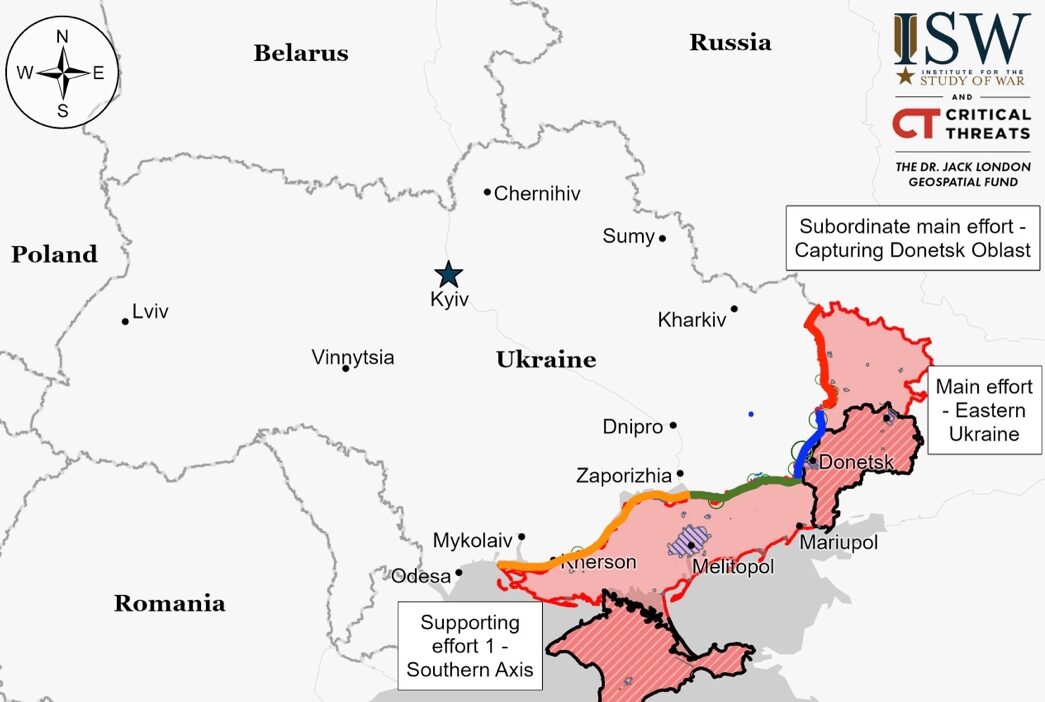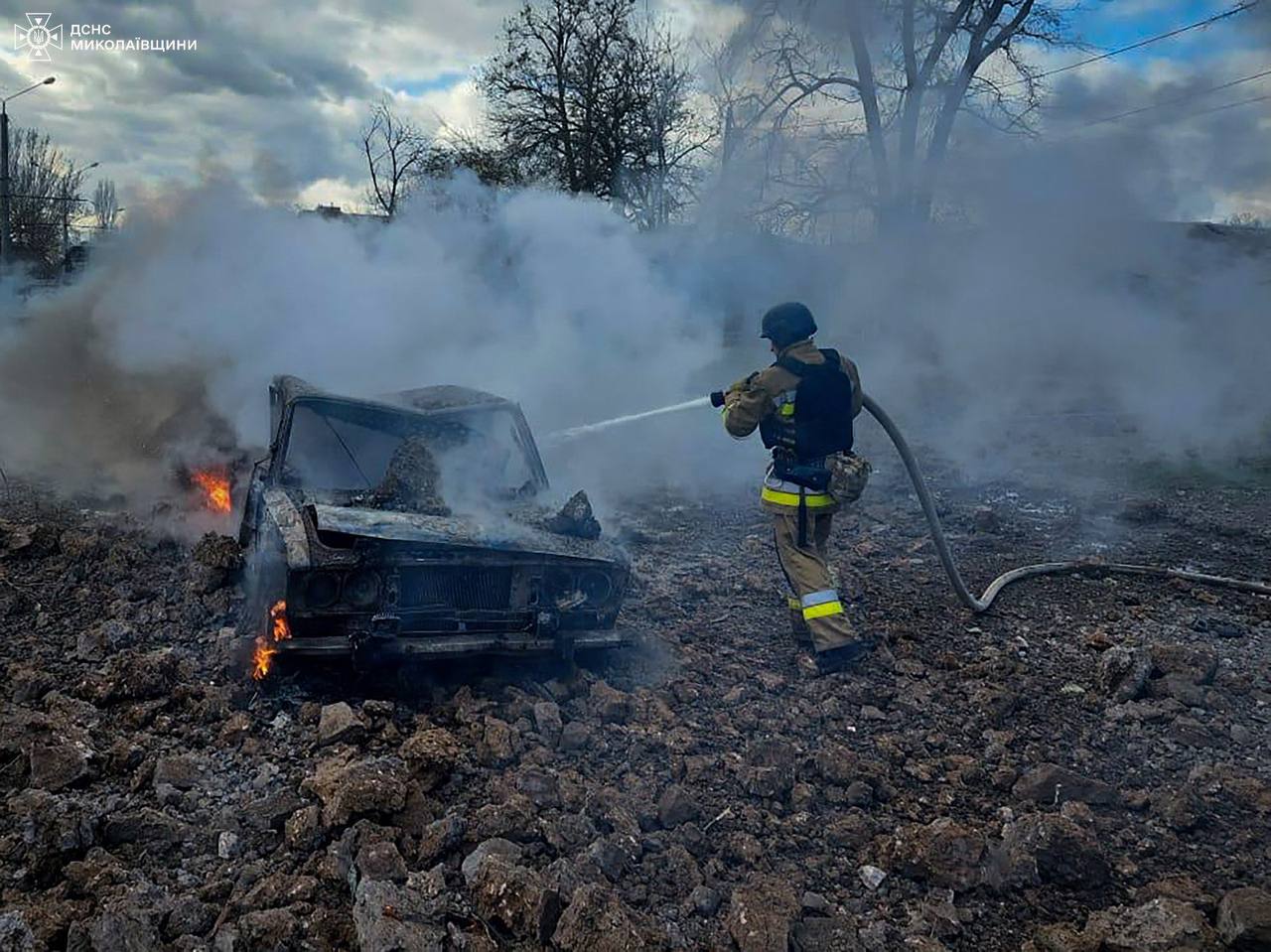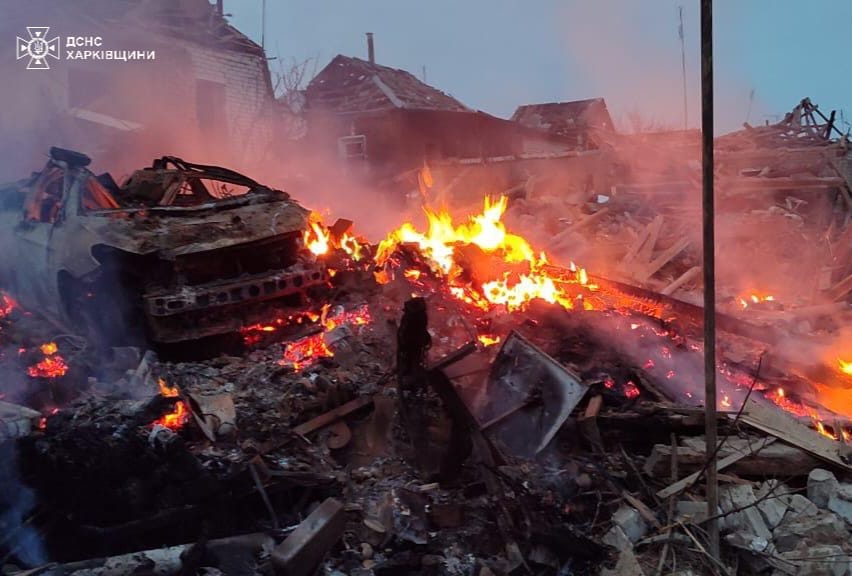Summary of the day: French President Emmanuel Macron stressed the necessity of European backing for Ukraine against Russia, citing it as vital for both Ukrainian and European security. In recent military developments, Ukrainian forces executed a drone strike on a Russian oil refinery, and pro-Ukrainian volunteers seized a building in Russia’s Belgorod Oblast. Meanwhile, tensions escalated with a drone attack on a military base in Transnistria and reported Russian troop advances near Avdiivka and Donetsk City. The Russian Ministry of Defense is taking measures to protect its Black Sea Fleet, amid concerns over the militarization of children in occupied Ukrainian territories, underscoring the conflict’s intensification and its broader geopolitical ramifications.
What Can I Do To Help Ukraine? This is a question I receive all the time. We at Transform Ukraine are building longer-term housing for internally displaced Ukrainians. Visit Rebuild Ukraine for how you can assist in housing a Ukrainian family displaced by the war.
Situation On The Ground And Air
Ukraine’s air defense systems are at risk of running out of munitions by the end of March, potentially reducing their missile interception rate significantly, according to a report from the Washington Post citing unnamed Western officials. The current U.S. aid impasse in Congress, with a $60 billion package for Ukraine stalled, exacerbates the situation. Without new aid, significant Russian territorial advances are feared by the summer, with Ukrainian morale and momentum reportedly low. Recent Russian gains, including the capture of Avdiivka and neighboring villages, underline the urgency for support. The ongoing U.S. aid delay is linked to Ukraine’s military setbacks and an imminent risk of a Russian breakthrough. Meanwhile, missile strikes continue in Ukraine, with a recent attack in Odesa resulting in 21 deaths and over 70 injuries. The UN reports over 10,500 civilian casualties since 2022, with actual numbers likely higher.
Ukrainian forces successfully repelled three Russian reconnaissance and sabotage attempts near the Ukrainian-Russian border in Sumy Oblast, specifically around Stara Huta and Brusky. It remains uncertain if these were new incidents or part of earlier reported activities in the same area.

Luhansk Front – Initiative Russia
Donetsk Front – Initiative Russia
Zaporizhia Front – Initiative Russia
Kherson (Dnipro River) Front – Initiative Russia
Fighting persisted along the Kupyansk-Svatove-Kreminna line without shifts in the frontline. Clashes were reported near Kupyansk, west and south of Kreminna. Chechen forces and Russian special forces were active near Bilohorivka and Lysychansk, respectively, indicating ongoing military engagements in the area.
Russian forces launched an unsuccessful attack in the Siversk area, northeast of Bakhmut, and Ukrainian troops repelled an assault near Rozdolivka. Russian military units remained active near Spirne. Around Bakhmut, ongoing battles did not alter the front lines, with skirmishes reported in several areas around the city.
Russian forces made slight gains northwest and west of Avdiivka, with ongoing battles reported in the area. Evidence from geolocated footage and military bloggers suggests advancements near Tonenke and into Orlivka’s central part. Positional fighting also persisted around Avdiivka, including near Oleksandropil, Novobakhmutivka, Berdychi, and towards the southwest near Pervomaiske and Nevelske.
On the Donetsk City frontline, both Russian and Ukrainian forces made advancements amidst ongoing battles. Evidence from recent footage shows Russian attacks near Novomykhailivka, suggesting Ukrainian progress in the area. Additionally, Russian troops slightly advanced near Marinka, just west of Donetsk City. The conflict continues around Donetsk, especially west and southwest of the city, including near Krasnohorivka and Novomykhailivka.
In the Donetsk-Zaporizhia border region, battles continued. Reports from a Russian military blogger indicated Russian advances near Malynivka, southwest of Velyka Novosilka. The Russian Defense Ministry stated that their forces thwarted Ukrainian attacks near Velyka Novosilka, specifically around Vodyane, Volodymyrivka, and Urozhaine. Russian forces are active near Staromayorske, further south of Velyka Novosilka.
Russian troops captured Myrne in western Zaporizhia Oblast, continuing the area’s ongoing battles. Additional advances by Russian forces were reported near Robotyne and Verbove.
Ongoing battles occurred on Kherson Oblast’s east bank, especially near Krynky and the Antonivsky bridge area.
Human Cost Of War
In the past 24 hours, Russian attacks on civilian targets resulted in the death of 2 people and injuries to at least 17 others:
- A Russian missile attack on Mykolaiv resulted in one death and eight injuries, including a child. The southern city faced two missile strikes, damaging over 10 multistory buildings, 50 private houses, and numerous cars.
- Russian aerial bomb attacks on Velyka Pysarivka in Sumy Oblast resulted in one death and one injury. The strikes damaged 15 homes, a multi-story residential building, and several public facilities including a shop, cultural center, library, hospital, and kindergarten.
- Russian forces launched two strikes on Sumy, targeting infrastructure sites in the northern city. Rescue teams are on the scene, but the full extent of the damage is still unknown. So far, no casualties have been reported.
- The mayor of Konotop, Sumy Oblast, Artem Semenikhin, announced that the town was attacked twice by Russian troops at around 9 p.m. local time, targeting infrastructure. Further details on the attack were not disclosed.
- In Vovchansk, Kharkiv Oblast, an aerial bombing by Russian forces injured at least one person and caused a large fire, affecting residential areas and damaging several buildings and vehicles.
- Five people were injured in Russian drone attacks on Nikopol, Dnipropetrovsk Oblast, including an incident at a gas station that left three men wounded. Another attack later in the day injured two more individuals. While three victims are recovering at home, the condition of the other two remains unreported. The strikes damaged an infrastructure facility, buildings, and homes, as well as a power line in a nearby village.
 The aftermath of Russian missile attack against Mykolaiv
The aftermath of Russian missile attack against Mykolaiv
 The aftermath of the Russian attack on Vovchansk
The aftermath of the Russian attack on Vovchansk
Ukraine News
Russian forces executed drone and missile attacks across Ukraine, targeting Kharkiv, Donetsk, and Chernihiv with missiles and Mykolaiv City with two ballistic missiles. Additionally, from Crimea, 16 Shahed drones were launched, with Ukrainian forces intercepting most over Odesa Oblast. Some drones managed to damage agricultural facilities in Odesa.
A drone attack targeted a military base in Transnistria, a pro-Russian region in Moldova, amidst claims of a Kremlin campaign to destabilize Moldova. The strike, which hit a long-grounded helicopter, was reported by Transnistrian media, suggesting the drone came from Odesa Oblast’s direction. No direct accusations have been made against Ukrainian forces, though some speculate on Ukraine’s involvement. Moldovan officials view the incident as an attempt to incite fear and suggest it’s part of a larger misinformation campaign. Ukrainian intelligence labels it a Russian provocation, aimed at manipulating public perception and justifying further destabilizing actions in Moldova. The event’s details and perpetrators remain unconfirmed, but it aligns with concerns over Russian efforts to undermine Moldovan stability.
Ukrainian President Volodymyr Zelensky emphasized that Russian President Vladimir Putin fears justice and should be tried at the International Criminal Court in The Hague, particularly highlighting this during Russia’s recent presidential elections. According to Zelensky, these elections, yielding Putin 87% of the vote for a potential fifth term extending his rule to 2030, lacked legitimacy, describing them as a facade to maintain Putin’s grip on power. Zelensky criticized the 2020 vote that amended Russia’s constitution to enable Putin’s extended presidency, effectively cementing his autocratic rule. He accused Putin of committing crimes to perpetuate his rule, stressing the need for accountability for actions in occupied Ukrainian territories. The elections were also internationally criticized, with the U.K., U.S., and Canada among the countries condemning the vote, particularly in Ukrainian territories under Russian control.
Ukrainian military intelligence has refuted Russian claims of killing up to 300 Ukrainian soldiers with a “vacuum bomb,” labeling the assertions as propaganda. The specific location of the alleged strike was not provided. Ukraine also denied Russia’s statement about eliminating 1,500 Ukrainian troops in the Kursk and Belgorod regions. Anti-Kremlin Russian groups, including the Freedom of Russia Legion, the Russian Volunteer Corps, and the Siberian Battalion, have been reported to engage in combat operations against Russia from Ukrainian territory. These groups consist of Russian citizens within Ukraine’s defense forces, confirmed Ukraine’s military intelligence spokesperson, Andrii Yusov.
Ukrainian Mobilization and Defense Industrial Base
Ukrainian authorities have exposed roughly 400 groups facilitating illegal border crossings for those evading military service since the start of the war in February 2022. Charges for these illicit services range from $7,000 to $10,000, often involving falsified health certificates. In 2023, border guards caught about 8,000 individuals trying to leave through unofficial checkpoints and 3,000 with fake documents. Reports suggest up to 20,000 Ukrainian men have avoided the draft. The government is working on new mobilization laws to better manage military recruitment, as men aged 18–60 are currently restricted from leaving Ukraine under martial law.
Ukraine’s Allies
French President Emmanuel Macron emphasized the importance of European support for Ukraine to ensure its victory against Russia, crucial for both Ukrainian and European security. Macron highlighted the need for faster military aid to Ukraine and stated that true peace requires Ukraine’s territorial integrity and sovereignty. He insisted that negotiations should involve Russia and Ukraine directly, countering Russian narratives that diminish Ukraine’s agency. Macron suggested that French ground troops in Ukraine could be a possibility, though undesirable. He also proposed a ceasefire during the summer 2024 Olympics in Paris, which Russian officials largely dismissed, emphasizing France’s support for Ukraine. Macron affirmed that advocating for peace does not contradict Ukraine’s right to sovereignty and territorial integrity.
French President Emmanuel Macron has indicated his intent to visit Kyiv, bringing “specific solutions” to aid Ukraine in the war. While avoiding setting a precise date, Macron emphasized the practical impact of his visit, hinting at new avenues of cooperation and a strong message of support. This follows discussions of potential Western troop deployments to Ukraine, which he has not discounted, but deems unnecessary at present
Czechia aims to propose an EU-wide ban on Russian and Belarusian grain imports at the upcoming European Council meeting, according to Czech Agriculture Minister Marek Vyborny. Despite the conflict in Ukraine, the EU has seen over 1.5 million tons of grain imports from Russia in the past year. Czechia seeks to add grain to the EU’s existing sanctions against Russia. Previously, Latvia voted to prohibit certain Russian and Belarusian agricultural imports, and Lithuania has urged the EU to stop importing Russian grain crops.
Life in Russian-Occupied Ukraine
During Russia’s 2024 presidential election, numerous Ukrainians in occupied territories, including Crimea and parts of Kherson, Zaporizhzhia, Donetsk, and Luhansk oblasts, were compelled to participate. Despite only partial control of these regions, with the capitals of Kherson and Zaporizhzhia remaining under Ukrainian authority, reports emerged of Russian forces forcibly mobilizing locals to vote at mobile stations and outside polling places. Eyewitness accounts and social media evidence highlight Russian troops overseeing the voting process aggressively, even conducting home visits to ensure participation. Contradictions in voter registration figures raised further concerns, with the Russian Central Election Commission reporting 4.5 million registered voters in areas with an actual adult population of approximately 2.5 million, half of whom had fled due to the conflict. This manipulation extends to Ukrainian citizens in these areas, who were pressured to vote regardless of their refusal to accept Russian citizenship.
Russian authorities are actively integrating military training into the education of children in occupied Ukrainian territories, aiming to instill pro-Russian values and prepare a future generation for military service. The Luhansk Cadet Corps, set to open before 2025 under Russian control, will indoctrinate Ukrainian children with a sense of duty to Russia. This move is part of a broader strategy seen in Crimea and planned for Kherson and Zaporizhia, where military training for civilians, including children, is being expanded. Notably, the Young Cadets National Movement is being promoted, and an “Avangard” military education center in Sevastopol, scheduled for 2025-2027, will train around 5,000 children annually, with the Russian Black Sea Fleet involved in recruitment efforts. Additionally, in Yevpatoria, Crimea, a new “Avangard” center has already begun providing military training and patriotic activities for students. Reports also indicate efforts to attract Ukrainian children in Russian orphanages into these military programs, highlighting a systematic approach to militarize and Russify the youth in occupied areas.
Russia News
Ukrainian forces carried out a drone attack on a Russian oil refinery in Krasnodar Krai, causing a significant fire. The operation, reported by the Ukrainian State Security Service (SBU) and other military branches, targeted the Slavyansk oil refinery on the night of March 16 to 17. While Russia claimed to have neutralized several drones, at least two reportedly hit the refinery. This strike is part of a series of Ukrainian attacks on Russian oil facilities, with 12 refineries hit recently. These attacks are seen as impactful due to the challenges Russia faces in repairing these complex facilities amid international sanctions.
Pro-Ukrainian volunteer forces claimed to have taken control of an administrative building in Belgorod Oblast, Russia, highlighting ongoing tensions in the border area. The Freedom of Russia Legion and Siberian Battalion announced their entry into the Gorkovsky settlement, a claim met with skepticism or denial by Russian bloggers. Concurrently, Russia reported intercepting a Ukrainian helicopter near Sumy Oblast, allegedly heading to Belgorod, a statement Ukraine denies as misinformation. Despite Russian claims of minimal ground activity near Kozinka and Spodariushino in Belgorod, the situation underscores the continued cross-border confrontations.
In a symbolic protest against President Vladimir Putin, thousands of Russians coordinated a noon gathering at polling stations, encouraged by the late opposition leader Alexei Navalny and his widow, Yulia Navalnaya. This act of defiance aimed to amplify the anti-Putin sentiment during the last day of Russia’s presidential election, which reported a high voter turnout. Despite these peaceful protests and significant queues observed at polling stations across Russia, the Kremlin did not react, and over 75 protesters were arrested. Amidst Russia’s ongoing war against Ukraine and heightened suppression of dissent, Putin seeks a fifth term, facing no significant competition due to the exclusion or imprisonment of potential rivals. The election follows a 2020 vote extending Putin’s eligibility, effectively allowing him to remain in power potentially for life, in a country that Freedom House notes has never experienced a democratic power transition. Pro-Ukrainian raids into Russian territories present a strategic dilemma for Putin’s administration as the election unfolds.
The Russian Defense Ministry is focusing on defending its Black Sea Fleet (BSF) from Ukrainian attacks, possibly including a change in fleet leadership. During a visit to Sevastopol, Crimea, Defense Minister Sergei Shoigu ordered increased training and additional armaments for the fleet to counter aerial and unmanned strikes. Reports suggest Admiral Viktor Sokolov may have been replaced by Vice Admiral Sergei Pinchuk as BSF commander, though confirmation is pending. Ukraine’s offensive efforts have reportedly damaged a significant portion of the BSF, prompting a strategic redeployment of Russian naval assets. Shoigu’s actions indicate a move to bolster the fleet’s defenses amidst ongoing Ukrainian strikes.
Russian Mobilization and Defense Industrial Base
Russia is boosting efforts to recruit civilians into military service by offering financial incentives. A report highlighted that Tatarstan has temporarily raised the signing bonus from approximately $3,300 to $4,300 until March 25. Additionally, there’s a noted increase in advertisements on taxi driver forums, promising monetary rewards for enlisting in the Russian military, indicating a broader strategy to attract volunteers through financial motivations.
The U.K. Defense Ministry reported a significant decrease in Russian arms exports due to its extensive military needs for the war in Ukraine and sanctions affecting customer demand. According to a study by SIPRI, from 2019-2023, Russia’s arms exports dropped by 53%, causing it to fall to third in global arms export rankings. With only 12 countries receiving major Russian arms in 2023, down from 31 in 2019, the impact of sanctions and the war is evident. Despite this, Russia continues its intensive military campaign in Ukraine without apparent depletion of resources. France has now surpassed Russia to become the second-largest arms exporter after the U.S. Even with reduced arms sales, Russia’s economy is showing resilience, with the IMF predicting 2.6% GDP growth in 2024.
Russian Narratives and Propaganda
The Russian presidential election on March 17, 2024, likely saw President Vladimir Putin re-elected, with exit polls indicating 87% voter support. This outcome aligns with expectations and efforts by the Kremlin to showcase strong public backing for Putin. Authorities claimed high voter turnout, exceeding 70%, and accused the West of electoral interference. Despite official narratives, widespread protests and “Noon against Putin” demonstrations occurred both in Russia and globally, aiming to counteract vote manipulation. Opposition groups highlighted anti-war sentiments, while at least 75 protestors were detained on election day. Reports also mentioned confrontations between demonstrators and groups of veterans and athletes.
Source Materials
Institute for the Study of War – understandingwar.org
The Kyiv Independent – kyivindependent.com
Kyiv Post – kyivpost.com
